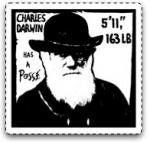
Charles Darwin's On the Origin of Species was published on November 24, 1859, and the sesquicentennial festivities are everywhere! In addition to Steve Jones's summary of the Origin for New Scientist, the British Council and the Open University's webcast on "Darwin, the Origin, and the Future of Biology," and the National Science Foundation's new website on Evolution of Evolution: 150 Years of Darwin's On the Origin of Species, here is a sampling of further articles and resources about the anniversary and its significance.
E. O. Wilson contributed a selection from his speech for the "Darwin, the Origin, and the Future of Biology" event to the Independent (November 24, 2009), writing, "Great scientific discoveries are like sunrises. ... In fact, nothing in science as a whole has been more firmly established by interwoven factual information, or more illuminating[,] than the universal occurrence of biological evolution. Further, few natural processes have been more convincingly explained than evolution by the theory of natural selection, or as it has been popularly called, Darwinism."
Lauri Lebo, the author of The Devil in Dover: An Insider's Story of Dogma v. Darwin in Small-Town America (New Press, 2008) contributed "Single Greatest Idea Ever: On the 150th Anniversary of Darwin’s Origin of Species" to Religion Dispatches (November 24, 2009). "A century and a half after the publication of Darwin’s foundational work, attacks on his ideas continue — including evangelicals distributing a newly altered version. But it will take more than banana-wielding fundamentalism to undermine the validity of evolutionary theory."
Also at Religion Dispatches (November 24, 2009), Edward J. Larson, the Pulitzer-Prize-winning author of Summer for the Gods: The Scopes Trial and America's Continuing Debate over Science and Religion (Basic Books, 1997) contributed "'I Had No Intention to Write Atheistically': Darwin, God, and the 2500-Year History of the Debate." "The argument between science and theology is as old as ancient Greece, where scientific rationalism first flourished, but it was revived with the advent of Darwinism." Look for Larson's pastiche of Aristophanes' The Clouds toward the end!
In the Washington Post's On Faith column (November 24, 2009), Deborah Heiligman, the author of Charles and Emma: The Darwins' Leap of Faith (Henry Holt, 2008), a 2009 National Book Award finalist, offers "A dozen reasons to celebrate Darwin" — noting both that "Charles Darwin was a genius. He had a great idea — evolution by natural selection — that has withstood the test of time" and also that "Charles Darwin was a hard worker... He took years and years to perfect his theory so that it would be as airtight as possible." She concludes, "We should teach our children about Charles Darwin."
In Newsweek (November 23, 2009), Mary Carmichael argues in "Nature's Little Scientists" for teaching evolution to young children, writing, "Without evolution, biology isn't really science — it's just memorization — and our kids, even the littlest ones, deserve a more interesting introduction to the natural world than that. It's time we gave it to them." Among the innovative resources mentioned are the Charlie’s Playhouse line of evolution-focused educational toys and the Concord Consortium's interactive, technology-driven fourth-grade curriculum called Evolution Readiness.
NCSE Supporter Sean B. Carroll inaugurated his new Remarkable Creatures column in The New York Times with "In snails and snakes, features to delight Darwin" (November 24, 2009). "Darwin's genius was in finding great general truths among the details of humble, often obscure creatures," he observed. Be sure also to visit the Times's interactive version of the Origin: "As with many original sources, it is known mostly by reputation but Darwin's writing can still offer surprises, insights and pleasures. It can be sampled here, with selections by prominent scientists of their favorite passages."
And the Darwin Manuscripts Project at the American Museum of National History is celebrating the anniversary by uploading thousands high quality images of Darwin's scientific manuscripts and notes to its website. David Kohn, director and general editor of the Darwin Manuscripts Project, told Live Science (November 23, 2009), "These rare manuscript leaves from Origin are the crown jewels of our project and show Darwin in the process of writing. ... I've sat in the Cambridge University Library since 1974, touching these documents, but this is the first time that anyone can do this — online in this quantity and with this quality."
